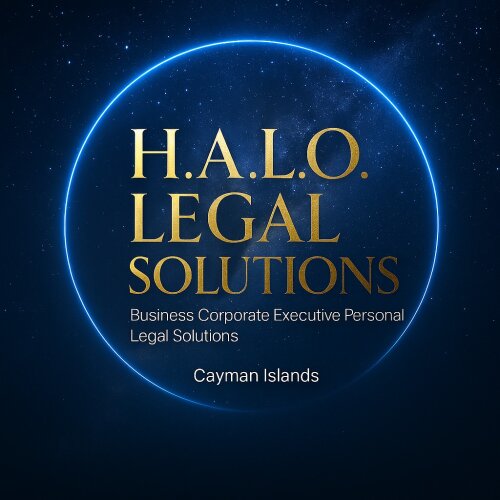Best Sustainable Finance Lawyers in Cayman Islands
Share your needs with us, get contacted by law firms.
Free. Takes 2 min.
Or refine your search by selecting a city:
List of the best lawyers in Cayman Islands
About Sustainable Finance Law in Cayman Islands
Sustainable finance in the Cayman Islands refers to financial activities that consider environmental, social, and governance (ESG) factors in investment decisions. As one of the world’s leading financial centers, the Cayman Islands has recognized the growing importance of blending sustainable practices with financial services. Sustainable finance aims to support economic growth while reducing pressures on the environment, addressing social inequalities, and promoting responsible corporate governance. In recent years, the Cayman Islands has made efforts to align its legal and regulatory environment with international standards connected to ESG and sustainable finance, responding to demand from investors, asset managers, and global regulators.
Why You May Need a Lawyer
Navigating sustainable finance in the Cayman Islands can be complex. Financial institutions, investment funds, and private clients may all encounter legal challenges when incorporating ESG principles into their operations. You might need legal assistance if you are:
- Setting up ESG-focused investment funds or vehicles
- Ensuring compliance with local and international sustainability regulations and frameworks
- Preparing ESG disclosures and mandatory reporting
- Drafting contracts or policies that incorporate sustainability provisions
- Engaged in due diligence for mergers, acquisitions, or investments with sustainability considerations
- Responding to inquiries from regulators regarding ESG matters
- Structuring green bonds, sustainability-linked loans, or other financial instruments
- Seeking advice on tax, governance, and reputational risks associated with sustainable finance
Legal specialists can help clients understand the evolving regulatory landscape, mitigate risks, and ensure that their initiatives align with best practices and legal obligations.
Local Laws Overview
The Cayman Islands does not have separate or standalone statutes specific to sustainable finance. Instead, sustainability obligations and ESG requirements are incorporated into existing financial regulations and overseen by local regulators. Key aspects of the local legal landscape include:
- Cayman Islands Monetary Authority (CIMA): CIMA oversees financial services and has issued guidance focused on risk management, disclosures, and governance practices, including ESG-related considerations.
- Mutual Funds Act and Private Funds Act: These Acts require certain funds to adhere to disclosure and reporting obligations, which increasingly include sustainability and ESG factors.
- International Compliance: The Cayman Islands aligns with global standards such as those developed by the Financial Action Task Force (FATF), the International Organization of Securities Commissions (IOSCO), and the European Union's Sustainable Finance Disclosure Regulation (SFDR), particularly when dealing with cross-border structures.
- Anti-Money Laundering (AML) Regulations: ESG investments may need enhanced due diligence to comply with AML and know-your-client (KYC) rules.
- Corporate Governance Codes: Corporate governance guidelines encourage companies to integrate ESG factors into decision-making and reporting.
Clients with Cayman entities or structures should be aware that the sustainability regulatory environment will continue to evolve and may be impacted by new rules issued locally or by international partners.
Frequently Asked Questions
What is sustainable finance in the context of the Cayman Islands?
Sustainable finance refers to financial services and products that incorporate ESG considerations into their operations, investments, and decision-making. In the Cayman Islands, this covers activities like sustainable investing, green bonds, and ESG-compliant funds.
Are there specific laws regulating sustainable finance in the Cayman Islands?
There are no standalone sustainable finance laws. However, ESG requirements are embedded within existing financial services legislation, and local guidance adapts to international best practices.
Which regulator oversees sustainable finance activities in the Cayman Islands?
The Cayman Islands Monetary Authority (CIMA) oversees most financial entities and issues relevant guidance on sustainable finance.
Are Cayman-based funds required to make ESG disclosures?
Depending on fund type, investor expectations, and cross-border regulations, many Cayman-based funds are increasingly required to provide ESG disclosures, especially when accessing European or global markets.
Can we structure green bonds or sustainability-linked financial products in the Cayman Islands?
Yes, it is possible to establish and issue green bonds, sustainability-linked loans, and similar ESG financial products in line with global frameworks and local regulations.
How do international guidelines affect Cayman Islands sustainable finance regulations?
Global standards such as the EU’s SFDR, FATF recommendations, and IOSCO guidelines influence local practices, especially for funds or structures with overseas investors or listings.
What are the main legal risks with sustainable finance in the Cayman Islands?
Key legal risks include non-compliance with disclosure rules, insufficient due diligence, greenwashing claims, inadequate governance, and reputational damage.
Do ESG requirements apply to all types of financial entities?
ESG requirements most commonly apply to investment funds, financial institutions, and regulated entities, but all businesses are encouraged to consider ESG in their governance.
If my fund only invests in the Cayman Islands, do international ESG rules still apply?
If your investors or listings are international, or you market to clients overseas, you may need to comply with both local and foreign ESG frameworks.
How do I choose a lawyer for sustainable finance matters?
Select a lawyer or firm with experience in ESG law, Cayman Islands financial regulation, and a track record of assisting clients with sustainable finance products and compliance.
Additional Resources
To deepen your understanding and stay current on the latest developments in sustainable finance in the Cayman Islands, consider the following resources:
- Cayman Islands Monetary Authority (CIMA) - regulatory guidance and updates
- Cayman Finance - industry advocacy and education in financial services
- Cayman Islands Government - policy statements on climate and sustainability
- Green Finance Institute and major law firms with sustainable finance practices
- International Capital Market Association (ICMA) - principles and resources for green, social, and sustainability-linked bonds
Accessing these resources can provide industry insights, legal updates, and policy guidance relevant to both professional and personal sustainable finance interests.
Next Steps
If you need legal assistance regarding sustainable finance in the Cayman Islands, consider taking these steps:
- Identify your specific needs, such as fund formation, regulatory compliance, or ESG disclosures
- Gather relevant documents, including existing fund structures, policies, and investor communications
- Research and shortlist qualified legal advisors or law firms with expertise in sustainable finance and Cayman Islands regulations
- Prepare questions about local laws, international compliance, and possible risks
- Schedule a consultation to discuss your objectives and obtain tailored legal advice
Remember, legal specialists can help you navigate the evolving landscape of sustainable finance, ensuring that your projects not only comply with current rules but are also positioned for future success in this dynamic area.
Lawzana helps you find the best lawyers and law firms in Cayman Islands through a curated and pre-screened list of qualified legal professionals. Our platform offers rankings and detailed profiles of attorneys and law firms, allowing you to compare based on practice areas, including Sustainable Finance, experience, and client feedback.
Each profile includes a description of the firm's areas of practice, client reviews, team members and partners, year of establishment, spoken languages, office locations, contact information, social media presence, and any published articles or resources. Most firms on our platform speak English and are experienced in both local and international legal matters.
Get a quote from top-rated law firms in Cayman Islands — quickly, securely, and without unnecessary hassle.
Disclaimer:
The information provided on this page is for general informational purposes only and does not constitute legal advice. While we strive to ensure the accuracy and relevance of the content, legal information may change over time, and interpretations of the law can vary. You should always consult with a qualified legal professional for advice specific to your situation.
We disclaim all liability for actions taken or not taken based on the content of this page. If you believe any information is incorrect or outdated, please contact us, and we will review and update it where appropriate.
Browse sustainable finance law firms by city in Cayman Islands
Refine your search by selecting a city.
















